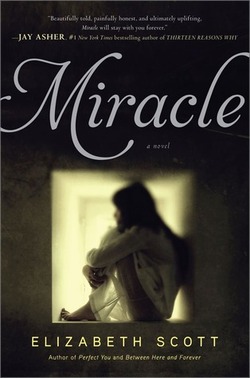{Review} Miracle by Elizabeth Scott
…I wish I had a scar or something from the crash. Something that would make my parents see I’m not a miracle. That I’m whatever the opposite of a miracle is.
Miracle by Elizabeth Scott
I wasn’t planning on reviewing this book today—I had a different post planned.
But, I started and finished Elizabeth Scott’s newest novel, Miracle, last night and just had to share my thoughts on it as soon as possible, especially since it’s, inexplicably, not gotten the attention that it deserves.
This quiet, yet raw, little novel (it’s just over 200 pages) tells the story of Megan (or Meggie, as most people call her) who’s the lone surivivor of a plane crash near her small town. She is found wandering on a country road, with no memory of the event. Everyone calls her a miracle—Miracle Megan.
The thing is, despite that she is physically unscathed, Meggie isn’t okay at all. She floats through life, quickly losing interest in everything: school, soccer, friends, family. And then the memories of the plane crash start to return and she stops sleeping, lost in the trauma of what she survived.
“I’m happy to be home,” I said over and over again, until it sounded like less than words, like it was nothing. ‘I’m just so happy.”
The thing was, I didn’t feel happy.
I didn’t feel anything.
The effects of Post-Traumatic Stress Disorder feel incredibly immediate in Miracle.
It’s a funny thing, because Meggie’s PTSD manifests itself in complete detachment, she just shuts off. And yet, the narrative is incredibly engaging. It’s intense without being overwrought. Scott’s depiction walks a delicate, effective line in its exploration of surivivor’s guilt without being heavy-handed or manipulative.
Meggie really kind of a jerk in much of the story. She treats her friends and family pretty horribly, and at times I didn’t feel particularly sympathetic toward her. And yet, at the same time, I felt incredibly compassionate for her—it’s not easy being in her head, even for just 224 pages. She’s just there much of the time.
It was a nowhere place and I liked that, stood there because it felt like it was where I belonged.
If you require a narrator whom you’ll find relatable and likable, Miracle may be a frustrating read. I have an affection for challenging main characters, but I completely understand why someone would find Meggie’s voice off-putting. But, if you give her a chance, Meggie’s story is absolutely gripping, though in a subtle way.
The evolution of Meggie’s relationships resulting from her PTSD is the most compelling theme in Miracle.
Meggie’s parent really don’t understand what’s happened to their daughter. She tells them at the hospital that she doesn’t recall what happened, and they don’t push any further. They are just so, understandably, grateful that she’s survived—they’d been told she had perished along with the other people on her flight. They avoid pushing their daughter on how she’s doing, on the cause of her headaches, on why she’s failing school. It’s an understandable (though irresponsible) reaction.
Scott’s writing is particularly deft with the characterization of Meggie’s parents. They could have easily been the “bad guys” in Miracle, but I found myself feeling very sympathetic toward them. Really, there is no manual for dealing with a situation like the one they faced and they do the best they can, despite that it’s not really enough.
Meggie isn’t left completely adrift, however.
She eventually eventually gets to know Joe, who lives next door (they’ve only ever spoken a few times, as Joe spent high school away at military school), during her late-night runs to avoid the horror of the memories of the crash that slowly sneak back through her dreams and in flashbacks. There are too important things about Joe. First,
He was so good looking it seemed like words needed to be invented to describe him. Something like gorgeosity. Or hotiful.
And, he suffers the same type of guilt as Meggie, which leads to the pair developing a sort of understanding.
“You seem a little…different than you were before.”
“I-I am,” I said. “But most people don’t see that. They look at me and they don’t even see me. They just see this thing, you know?”
The book’s blurb suggests that the relationship with Joe is at the center of Meggie’s story, but that’s fairly misleading.
Her connection with Joe is extremely important to the story, but it’s not a Big R Romance. The two connect in a way that they both need at a time when they’re both lost. It was very touching, but as very appropriate—a Big R Romance would have felt forced. It’s a softer, subtler thing that may become something bigger. I loved that the book went in this direction, which is funny, because the other book I’ve read this year about PTSD, Something Like Normal, has a Big R Romance, and I loved the direction that took too. (To be honest, I could read a whole book about Joe—his story is truly heartbreaking and he’s a bit of a Tim Riggins-type character, which you know I fully support.)
Meggie also connects with someone else who understands, Margaret, who along with her late partner Rose, is a Vietnam veteran. This was my favorite relationship in Miracle.
Because Margaret can see the other side of PTSD, she provides Meggie with the gentle guidance she needs following the horrible trauma she’s experienced. In their small town, Margaret is a bit of a controversial figure because she’s gay, and she’s just the friend Meggie needs at this time in her life. While it’s not overt, the idea that they’re both outsiders or oddballs in their oppressive everyone-knows-everyone’s-business small town is an intriguing theme that unites these unlikely friends.
There’s a subtle aspect to Miracle that also struck me, and that’s the power of words and labels.
Meggie is proclaimed a “miracle” by most of the people in her life. And while these people—including her parents—are well-meaning and just so happy that she’s a survivor, that’s a huge burden to place on someone. How can anyone live up to the label of “Miracle”? It made me think of all the times we assign those terms to people and how unfair that really is. Ultimately, Meggie is just a girl who happened to survive something, and the pressures of being a “miracle” is far too great.
Nothing; it was nothing and I’d known my parents wanted the crash to have left me whole, wanted to believe I was fine. That it had even somehow made me special.
I’d never thought that if they knew something was definitely wrong with me, in me, they’d pretend it away.
But that’s what happened. What was happening.
This made me think of all the people who are assigned this type of extreme label—we hear it on the nightly news daily, don’t we? What a heavy thing to live with that must be. Scott explores this without judgment—we understand why Meggie’s parents call her Miracle Megan, but she also shows us how harmful this label is as well. It’s a striking tension.
“It sucks,” he said. “People here look at you and see all kinds of stuff, not about you, but about your family, and all you want is for them to look at you and see true.”
“See true?”
“See you. Who you really are.”
As I mentioned, Meggie’s experiences feel very immediate. This surprised me because it’s written in past-tense; usually when I describe something that way, I can look back and almost every time the novel is written in first-person present (see Come See About Me, This is Not a Test). I suppose that’s not particularly relevant to anything, but I can’t recall a book that evoked that feeling for me that I’ve read recently that was written in that manner—it makes Miracle stand out for me.
After I finished Miracle I immediately recommended it to someone who’s experienced a traumatic event. I wouldn’t have done so if I wasn’t so confident in Scott’s depiction of the experience of PTSD. It’s an emotionally intense read, but it’s also very authentic, while Meggie’s bravery (I read her as a very brave character) was inspiring and ultimately left me feeling quite hopeful.
FNL Character Rating: Becky Sproles; Becky is one of those odd characters whose struggles frustrated me, but who I also found to be quite brave.
{Buy Miracle at Amazon | Book Despository | BN | iBooks}
{Add it on Goodreads}
Note: I strongly recommend that you read the author’s post about her own experience with PTSD.

{Book Matchmaker} Unah Wants a Dash of Magic, Adventure and Romance






